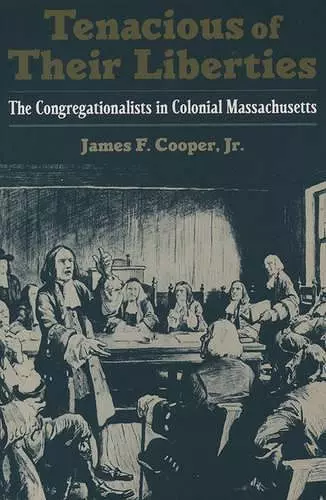Tenacious of Their Liberties
The Congregationalists in Colonial Massachusetts
Format:Paperback
Publisher:Oxford University Press Inc
Published:8th Aug '02
Currently unavailable, and unfortunately no date known when it will be back
This paperback is available in another edition too:
- Hardback£30.49(9780195113600)

Although the importance of Congregationalism in early Massachusetts has engaged historians' attention for generations, this study is the first to approach the Puritan experience in Congregational church government from the perspective of both the pew and the pulpit. For the past decade, author James F. Cooper, Jr. has immersed himself in local manuscript church records. These previously untapped documents provide a fascinating glimpse of lay-clerical relations in colonial Massachusetts, and reveal that ordinary churchgoers shaped the development of Congregational practices as much as the clerical and elite personages who for so long have populated histories of this period. Cooper's new findings will both challenge existing models of church hierarchy and offer a new dimension to our understanding of the origins of New England democracy. Refuting the idea of clerical predominance in the governance of colonial Massachusetts churches, Cooper shows that the laity were both informed and empowered to rule with ministers, rather than beneath them. From the outset of the Congregational experiment, ministers articulated--and lay people embraced--principles of limited authority, higher law, and free consent in the conduct of church affairs. These principles were codified early on in the Cambridge Platform, which the laity used as their standard in resisting infringements upon their rights. By neglecting the democratic components of Congregationalism, Cooper argues, scholars have missed the larger political significance of the movement. Congregational thought and practice in fact served as one indigenous seedbed of several concepts that would later flourish during the Revolutionary generation, including the notions that government derives its legitimacy from the voluntary consent of the governed, that governors should be chosen by the governed, that rulers should be accountable to the ruled, and that constitutional checks should limit both the governors and the people. By examining the development of church government through the perspective of lay-clerical interchange, Cooper comes to a fresh understanding of the sometimes noble, sometimes sordid, and sometimes rowdy nature of church politics. His study casts new light upon Anne Hutchinson and the "Antinomian Controversy," the Cambridge Platform, the Halfway Covenant, the Reforming Synod of 1679, and the long-standing debate over Puritan "declension." Cooper argues that, in general, church government did not divide Massachusetts culture along lay-clerical lines, but instead served as a powerful component of a popular...
This book is a significant contribution to our thinking about Puritanism and its connection to the Revolution. * Journal of American History *
ISBN: 9780195152876
Dimensions: 152mm x 231mm x 20mm
Weight: 435g
304 pages